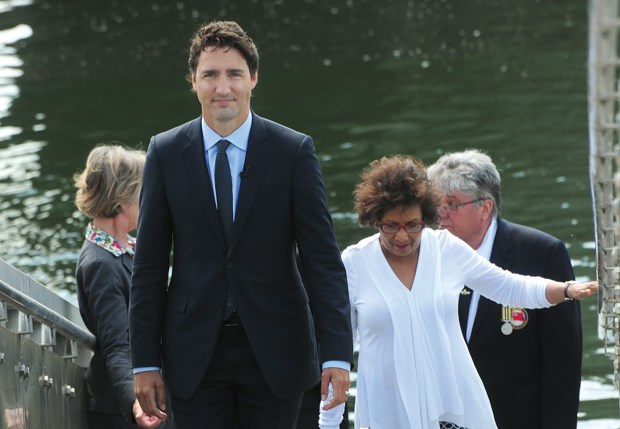Federal Liberal leader Justin Trudeau landed on the North Vancouver waterfront Friday morning, campaigning to keep the Lower Mainland’s coastline out of the sticky mess it was in during April’s bunker fuel spill.
Trudeau, flanked by his Vancouver MPs and North Shore candidates Pamela Goldsmith-Jones, Jonathan Wilkinson and Terry Beech, was in town to reiterate a previous promise of reopening a full service Coast Guard station to protect the local harbours and coastline.
This time, however, he had former commander of the Kitsilano Coast Guard base Fred Moxey at his side. Moxey had given Trudeau a tour of the areas affected by the fuel spill that saw globs of oil washing up on beaches around Burrard Inlet.
“We really all know that oil spills like the one we had recently are a real threat to Vancouver, to British Columbia and to all Canadians,” Trudeau said. “We also know that Mr. Harper’s cuts to marine safety resources and the closure of Vancouver’s Kitsilano Coast Guard base have undermined our capacity and our ability to respond to spills like these and to respond to other situations of emergency and distress.”
But it was not a question of how to deal with a spill that gathered media wanted to know about so much as whether there should be more tankers traversing the inlet.
Trudeau wouldn’t say whether his government would approve or reject Kinder Morgan’s application for a new pipeline to Burrard Inlet. But he had sharp critiques of the process so far, accusing the Conservative government of politicizing the National Energy Board and removing its ability to be an independent arbiter.
“The federal government’s job isn’t to come down in favour on one side or another of a project while it’s underway. It’s not to put the thumb on the scale and be a cheerleader for a project. It’s about being a referee,” he said.
Ultimately it’s on Kinder Morgan to “win over” not just the NEB but also the communities affected by any new pipeline, Trudeau said, noting “even though governments grant permits, ultimately only communities grant permission.”
The Tsleil-Waututh Nation has been adamant that it will fight Kinder Morgan’s pipeline plan in court. Trudeau would not say whether that amounted to a veto on the project.
“I think it’s a very, very compelling statement but at the same time, I recognize that an awful lot of it is coloured by the level of distrust people have for this Conservative government right now,” he said.
Getting Canada’s resources to market will still be an important part of the economy, Trudeau said, but it must be done safely and in such a way that it doesn’t threaten other sectors of the economy like fisheries and tourism. “You cannot separate what’s good for the economy and good for the environment anymore,” he said.
Trudeau remarked that coming to the North Shore was something of a homecoming, after making his way up the gangway to the North Vancouver waterfront. The party leader said he has fond memories of visiting his grandfather James Sinclair here. Sinclair was a Liberal MP representing North Shore ridings from 1940 to 1958.
“This was where my mom grew up. This was a deep part of my vision of Vancouver, whether it was going up Hollyburn as a kid or exploring all the beauty of the North Shore,” he said.
As a Vancouver teacher, Trudeau frequented the North Shore to mountain bike and he continues to have friends here, he said.
For a longer story based on a one-on-one interview with Justin Trudeau, click here.



